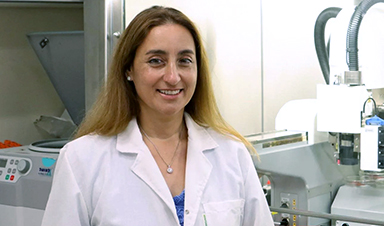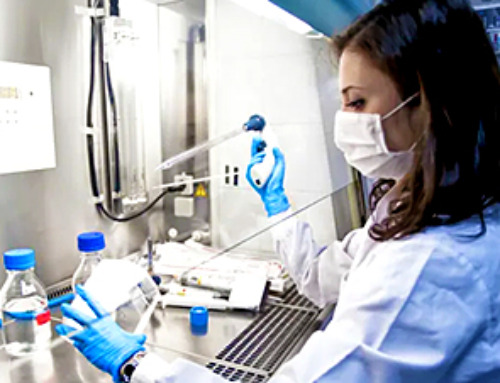A new nano-vaccine developed by TAU and the University of Lisbon offers a needle-free, room-temperature-storable solution against COVID-19, targeting all key variants effectively.
Professor Ronit Satchi-Fainaro's lab at Tel Aviv University's Faculty of Medical and Health Sciences has collaborated with Professor Helena Florindo's lab at the University of Lisbon to develop a novel nano-vaccine for COVID-19. This nano-vaccine, a 200-nanometer particle, effectively trains the immune system against all common COVID-19 variants, performing as well as existing vaccines.
Unlike other vaccines, it is conveniently administered as a nasal spray and does not require a cold supply chain or ultra-cold storage. These distinctive features pave the way for vaccinating populations in developing countries and the future development of simpler, more effective, and less expensive vaccines. The groundbreaking study was featured on the cover of the prestigious journal Advanced Science.
Development and Design of the Nano-Vaccine
Prof. Satchi-Fainaro explains: "The new nano-vaccine's development was inspired by a decade of research on cancer vaccines. When the COVID-19 pandemic began, we set a new goal: training our cancer platform to identify and target the coronavirus. Unlike Moderna and Pfizer, we did not rely on full protein expression via mRNA. Instead, using our computational bioinformatics tools, we identified two short and simple amino acid sequences in the virus's protein, then synthesized them, and encapsulated them in nanoparticles." Eventually, this nano-vaccine proved effective against all major variants of COVID-19, including Beta, Delta, Omicron, etc.
Benefits of the Nano-Vaccine: Needle-Free Administration
"Our nano-vaccine offers a significant advantage over existing vaccines because it is needle-free and administered as a nasal spray," notes Prof. Satchi-Fainaro. "This eliminates the need for skilled personnel such as nurses and technicians to administer injections, while also reducing risks of contamination and sharp waste. Anyone can use a nasal spray, with no prior training."
Advantages in Storage and Shipping
Another major advantage of the revolutionary nano-vaccine is its minimal storage requirements. Moderna's sensitive mRNA-based vaccine must be kept at -20°C and Pfizer's at -70°C, generating great logistic and technological challenges, such as shipping in special aircraft and ultra-cold storage – from the factory to the vaccination station.
Prof. Satchi-Fainaro's novel synthetic nanoparticles are far more durable and can be stored as a powder at room temperature. "There's no need for freezing or special handling," she says. "You just mix the powder with saline to create the spray. For testing purposes (as part of the EU's ISIDORe (Integrated Services for Infectious Disease Outbreak Research) feasibility program) we shipped the powder at room temperature to the INSERM infectious diseases lab in France. Their tests showed that our nano-vaccine is at least as effective as Pfizer's vaccine."
Future Implications and Expanding Applications
These important advantages—ease of nasal administration and regular storage and shipping — pave the way towards vaccinating at-risk populations in low-income countries and remote regions, which existing vaccines are unable to reach. Moreover, the novel platform opens the door for quickly synthesizing even more effective and affordable vaccines for future pandemics. "This is a plug-and-play technology," explains Prof. Satchi-Fainaro. "It can train the immune system to fight cancer or infectious diseases like COVID-19. We are currently expanding its use to target a range of additional diseases, enabling the rapid development of relevant new vaccines when needed."
Reference: "Intranasal Multiepitope PD-L1-siRNA-Based Nanovaccine: The Next-Gen COVID-19 Immunotherapy" by Rita C. Acúrcio, Ron Kleiner, Daniella Vaskovich-Koubi, Bárbara Carreira, Yulia Liubomirski, Carolina Palma, Adva Yeheskel, Eilam Yeini, Ana S. Viana, Vera Ferreira, Carlos Araújo, Michael Mor, Natalia T. Freund, Eran Bacharach, João Gonçalves, Mira Toister-Achituv, Manon Fabregue, Solene Matthieu, Capucine Guerry, Ana Zarubica, Sarit Aviel-Ronen, Helena F. Florindo and Ronit Satchi-Fainaro, 8 August 2024, Advanced Science.
DOI: 10.1002/advs.202404159
The groundbreaking project has received competitive research grants from the Israel Innovation Authority and Merck under the Nofar program, as well as funding from Spain's "La Caixa" Foundation Impulse as an accelerated program, and support from the ISIDORe feasibility program. It is also part of a broader vaccine platform development program at Professor Satchi-Fainaro's lab, supported by a European Research Council (ERC) Advanced Grant.
News
Urgent warning over deadly ‘brain swelling’ virus amid fears it could spread globally
Airports across Asia have been put on high alert after India confirmed two cases of the deadly Nipah virus in the state of West Bengal over the past month. Thailand, Nepal and Vietnam are among the [...]
This Vaccine Stops Bird Flu Before It Reaches the Lungs
A new nasal spray vaccine could stop bird flu at the door — blocking infection, reducing spread, and helping head off the next pandemic. Since first appearing in the United States in 2014, H5N1 [...]
These two viruses may become the next public health threats, scientists say
Two emerging pathogens with animal origins—influenza D virus and canine coronavirus—have so far been quietly flying under the radar, but researchers warn conditions are ripe for the viruses to spread more widely among humans. [...]
COVID-19 viral fragments shown to target and kill specific immune cells
COVID-19 viral fragments shown to target and kill specific immune cells in UCLA-led study Clues about extreme cases and omicron’s effects come from a cross-disciplinary international research team New research shows that after the [...]
Smaller Than a Grain of Salt: Engineers Create the World’s Tiniest Wireless Brain Implant
A salt-grain-sized neural implant can record and transmit brain activity wirelessly for extended periods. Researchers at Cornell University, working with collaborators, have created an extremely small neural implant that can sit on a grain of [...]
Scientists Develop a New Way To See Inside the Human Body Using 3D Color Imaging
A newly developed imaging method blends ultrasound and photoacoustics to capture both tissue structure and blood-vessel function in 3D. By blending two powerful imaging methods, researchers from Caltech and USC have developed a new way to [...]
Brain waves could help paralyzed patients move again
People with spinal cord injuries often lose the ability to move their arms or legs. In many cases, the nerves in the limbs remain healthy, and the brain continues to function normally. The loss of [...]
Scientists Discover a New “Cleanup Hub” Inside the Human Brain
A newly identified lymphatic drainage pathway along the middle meningeal artery reveals how the human brain clears waste. How does the brain clear away waste? This task is handled by the brain’s lymphatic drainage [...]
New Drug Slashes Dangerous Blood Fats by Nearly 40% in First Human Trial
Scientists have found a way to fine-tune a central fat-control pathway in the liver, reducing harmful blood triglycerides while preserving beneficial cholesterol functions. When we eat, the body turns surplus calories into molecules called [...]
A Simple Brain Scan May Help Restore Movement After Paralysis
A brain cap and smart algorithms may one day help paralyzed patients turn thought into movement—no surgery required. People with spinal cord injuries often experience partial or complete loss of movement in their arms [...]
Plant Discovery Could Transform How Medicines Are Made
Scientists have uncovered an unexpected way plants make powerful chemicals, revealing hidden biological connections that could transform how medicines are discovered and produced. Plants produce protective chemicals called alkaloids as part of their natural [...]
Scientists Develop IV Therapy That Repairs the Brain After Stroke
New nanomaterial passes the blood-brain barrier to reduce damaging inflammation after the most common form of stroke. When someone experiences a stroke, doctors must quickly restore blood flow to the brain to prevent death. [...]
Analyzing Darwin’s specimens without opening 200-year-old jars
Scientists have successfully analyzed Charles Darwin's original specimens from his HMS Beagle voyage (1831 to 1836) to the Galapagos Islands. Remarkably, the specimens have been analyzed without opening their 200-year-old preservation jars. Examining 46 [...]
Scientists discover natural ‘brake’ that could stop harmful inflammation
Researchers at University College London (UCL) have uncovered a key mechanism that helps the body switch off inflammation—a breakthrough that could lead to new treatments for chronic diseases affecting millions worldwide. Inflammation is the [...]
A Forgotten Molecule Could Revive Failing Antifungal Drugs and Save Millions of Lives
Scientists have uncovered a way to make existing antifungal drugs work again against deadly, drug-resistant fungi. Fungal infections claim millions of lives worldwide each year, and current medical treatments are failing to keep pace. [...]
Scientists Trap Thyme’s Healing Power in Tiny Capsules
A new micro-encapsulation breakthrough could turn thyme’s powerful health benefits into safer, smarter nanodoses. Thyme extract is often praised for its wide range of health benefits, giving it a reputation as a natural medicinal [...]





















